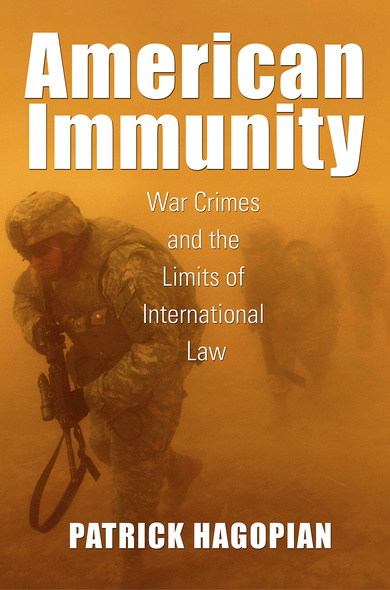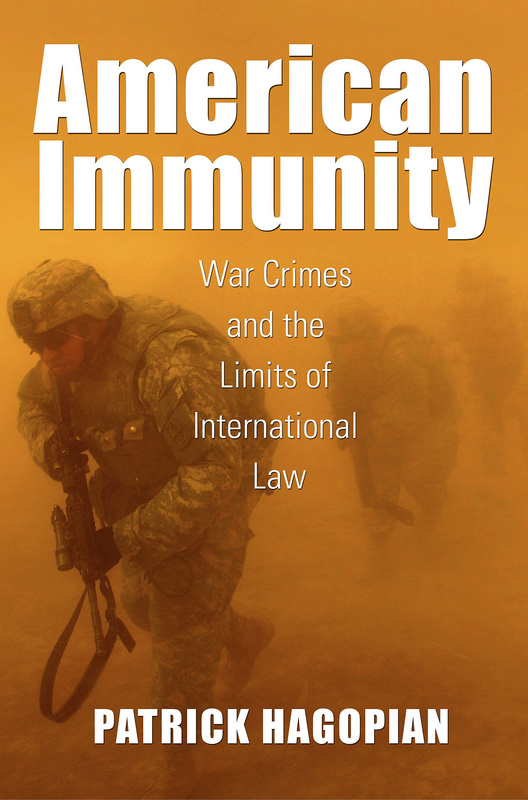American Immunity
War Crimes and the Limits of International Law
University of Massachusetts Press
In 1955 the Supreme Court ruled that veterans of the U.S. armed forces could not be court-martialed for overseas crimes that were not detected until after they had left military service. Territorial limitations placed such acts beyond the jurisdiction of civilian courts, and there was no other American court in which they could be adjudicated. As a result, a jurisdictional gap emerged that for decades exempted former troops from prosecution for war crimes. "This was not merely a theoretical possibility," Patrick Hagopian writes. Over a dozen former soldiers who participated in the My Lai massacre did in fact "get away with murder." Further court rulings expanded the gap to cover civilian employees and contractors that accompanied the armed forces.
In American Immunity, Hagopian places what he calls the "superpower exemption" in the context of a long-standing tension between international law and U.S. sovereignty. He shows that despite the U.S. role in promulgating universal standards of international law and forming institutions where those standards can be enforced, the United States has repeatedly refused to submit its own citizens and troops to the jurisdiction of international tribunals and failed to uphold international standards of justice in its own courts.
In 2000 Congress attempted to close the jurisdictional gap with passage of the Military Extraterritorial Jurisdiction Act. The effectiveness of that legislation is still in question, however, since it remains unclear how willing civilian American juries will be to convict veterans for conduct in foreign war zones.
In American Immunity, Hagopian places what he calls the "superpower exemption" in the context of a long-standing tension between international law and U.S. sovereignty. He shows that despite the U.S. role in promulgating universal standards of international law and forming institutions where those standards can be enforced, the United States has repeatedly refused to submit its own citizens and troops to the jurisdiction of international tribunals and failed to uphold international standards of justice in its own courts.
In 2000 Congress attempted to close the jurisdictional gap with passage of the Military Extraterritorial Jurisdiction Act. The effectiveness of that legislation is still in question, however, since it remains unclear how willing civilian American juries will be to convict veterans for conduct in foreign war zones.
An impressive, wide-ranging, multilayered work. Patrick Hagopian uses the problem of the jurisdictional gap to open up much larger questions—including public attitudes toward military justice and the death of civilians, the hostility toward international law and international legal institutions within sections of U.S. political culture, and the defensive response of political and military hierarchies to any effort to link individual war crimes to the principle of command responsibility.'—Kendrick Oliver, author of My Lai in American History and Memory
'At first glance, Patrick Hagopian's important and insightful book might appear of interest to only historians of military law. His careful reconstruction of events, however, reveals a decades-long political episode that let some people get away with murder--literally. . . . American Immunity is comprehensive but concise, impressively documented by primary sources (in sixty pages of footnotes) and clearly written. . . . It is an important and troubling story.'—Journal of American History
'The question of whether the rule of law applies to America's own military is at the heart of Patrick Hagopian's searing study American Immunity. The book is a thorough and powerful indictment of a system that has allowed some Americans, as the author puts it, to 'get away with murder.' . . . His palpable outrage makes American Immunity a compelling read.'—American Historical Review
Patrick Hagopian is senior lecturer in History and American Studies at Lancaster University and author of The Vietnam War in American Memory: Veterans, Memorials, and the Politics of Healing (University of Massachusetts Press, 2009).






